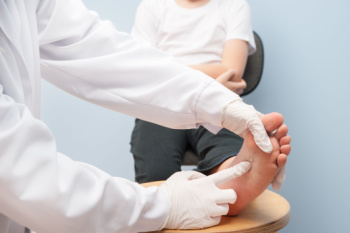Preventing Plantar Warts in Children
Tuesday, 02 July 2024 00:00
Plantar warts are a common issue in children, caused by the human papillomavirus, or HPV. These warts typically appear on the soles of the feet, causing discomfort and sometimes pain. The virus thrives in warm, moist environments, making public swimming pools, locker rooms, and communal showers common sources of infection. To prevent plantar warts, encourage children to wear protective footwear in these areas. Regularly washing feet and keeping them dry can also reduce the risk. It is important to avoid sharing shoes, socks, or towels to prevent the spread of the virus. If a child already has a plantar wart, covering it with a bandage can help prevent transmission. Promptly treating warts can also minimize discomfort and prevent them from spreading to others. Teaching children these habits can help protect them from plantar warts. If your child has developed a plantar wart, it is suggested that you visit a podiatrist who can properly treat this condition.
Plantar warts can be very uncomfortable. If you need your feet checked, contact Dr. Mark Spier from Maryland. Our doctor will assist you with all of your foot and ankle needs.
About Plantar Warts
Plantar warts are the result of HPV, or human papillomavirus, getting into open wounds on the feet. They are mostly found on the heels or balls of the feet.
While plantar warts are generally harmless, those experiencing excessive pain or those suffering from diabetes or a compromised immune system require immediate medical care. Plantar warts are easily diagnosed, usually through scraping off a bit of rough skin or by getting a biopsy.
Symptoms
- Lesions on the bottom of your feet, usually rough and grainy
- Hard or thick callused spots
- Wart seeds, which are small clotted blood vessels that look like little black spots
- Pain, discomfort, or tenderness of your feet when walking or standing
Treatment
- Freezing
- Electric tool removal
- Laser Treatment
- Topical Creams (prescription only)
- Over-the-counter medications
To help prevent developing plantar warts, avoid walking barefoot over abrasive surfaces that can cause cuts or wounds for HPV to get into. Avoiding direct contact with other warts, as well as not picking or rubbing existing warts, can help prevent the further spread of plantar warts. However, if you think you have developed plantar warts, speak to your podiatrist. He or she can diagnose the warts on your feet and recommend the appropriate treatment options.
If you have any questions please feel free to contact one of our offices located in Columbia and Reisterstown, MD . We offer the newest diagnostic and treatment technologies for all your foot and ankle needs.









